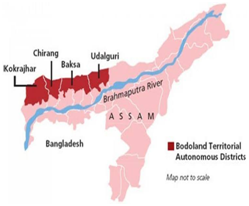

Recently, the Home ministry has extended the ban on the Assam-based insurgent group National Democratic Front of Bodoland (NDFB) by five more years for its involvement in a series of violent activities including killings and extortion, and for joining hands with anti-India forces.
Context
Recently, the Home ministry has extended the ban on the Assam-based insurgent group National Democratic Front of Bodoland (NDFB) by five more years for its involvement in a series of violent activities including killings and extortion, and for joining hands with anti-India forces.
About
- Bodos are the single largest tribal community in Assam, making up over 5-6 per cent of the state’s population. They have controlled large parts of Assam in the past.

- The four districts in Assam — Kokrajhar, Baksa, Udalguri and Chirang — that constitute the Bodo Territorial Area District (BTAD), are home to several ethnic groups.
- The Bodos have had a long history of separatist demands, marked by armed struggle.
- In 1966-67, the demand for a separate state called Bodoland was raised under the banner of the Plains Tribals Council of Assam (PTCA), a political outfit.
- In 1987, the All Bodo Students Union (ABSU) renewed the demand. “Divide Assam fifty-fifty”, was a call given by the ABSU’s then leader, Upendra Nath Brahma.
- The unrest was a fallout of the Assam Movement (1979-85), whose culmination — the Assam Accord — addressed the demands of protection and safeguards for the “Assamese people”, leading the Bodos to launch a movement to protect their own identity.
- In December 2014, separatists killed more than 30 people in Kokrajhar and Sonitpur. In the 2012 Bodo-Muslim riots, hundreds were killed and almost 5 lakh were displaced.
- The Home Ministry has declared the NDFB along with all its groups, factions, and front organisations as an “unlawful association” under the Unlawful Activities (Prevention) Act, 1967.
Who are the NDFB?
- Alongside political movements, armed groups have also sought to create a separate Bodo state.
- In October 1986, the prominent group Bodo Security Force (BdSF) was formed by Ranjan Daimary. The BdSF subsequently renamed itself as the National Democratic Front of Bodoland (NDFB), an organisation that is known to be involved in attacks, killings, and extortions.
- In the 1990s, Indian security forces launched extensive operations against the group, causing the latter to flee to bordering Bhutan. In Bhutan, the group faced stiff counter-insurgency operations by the Indian Army and the Royal Bhutan Army in the early 2000s.
NDFB factions and their activities
- In October 2008, bomb attacks in Assam carried out by the NDFB killed 90 people. In January this year, 10 operatives, including founder Ranjan Daimary, were convicted for their role in the attacks.
- After the blasts, the NDFB was divided into two factions — the NDFB (P), led by Gobinda Basumatary, and the NDFB (R), led by Ranjan Daimary.
- The NDFB (P) started talks with the central government in 2009. In 2010, Daimary was arrested and handed over to India by Bangladesh, and was granted bail in 2013. His faction too then began peace talks with the government.
- In 2012, Ingti Kathar Songbijit broke away from the NDFB (R) and formed his own faction, the NDFB (S). His faction is believed to be behind the killing of 66 Adivasis in Assam in December 2014. The NDFB (S) is against holding talks.
- In 2015, Songbijit was removed as the chief of the group and B Saoraigwra took over. This faction of the NDFB is still active, while Songbijit, himself a Karbi and not a Bodo, is said to have started his own militant group.
Why the demand for separate Bodoland?
- For centuries, they survived sanskritisation without giving up their original ethnic identity. However in the 20th century, they had to tackle a series of issues such as illegal immigration, encroachment of their lands, forced assimilation, loss of language and culture. The 20th century also witnessed the emergence of Bodos as a leading tribe in Assam which pioneered the movements for safeguarding the rights of the tribal communities in the area.
- From then on, they have been consistently deprived of the political and socio-economic rights by successive state and central governments. The Bodos have not only become an ethnic minority in their own ancestral land but have also been struggling for their existence and status as an ethnic community.


